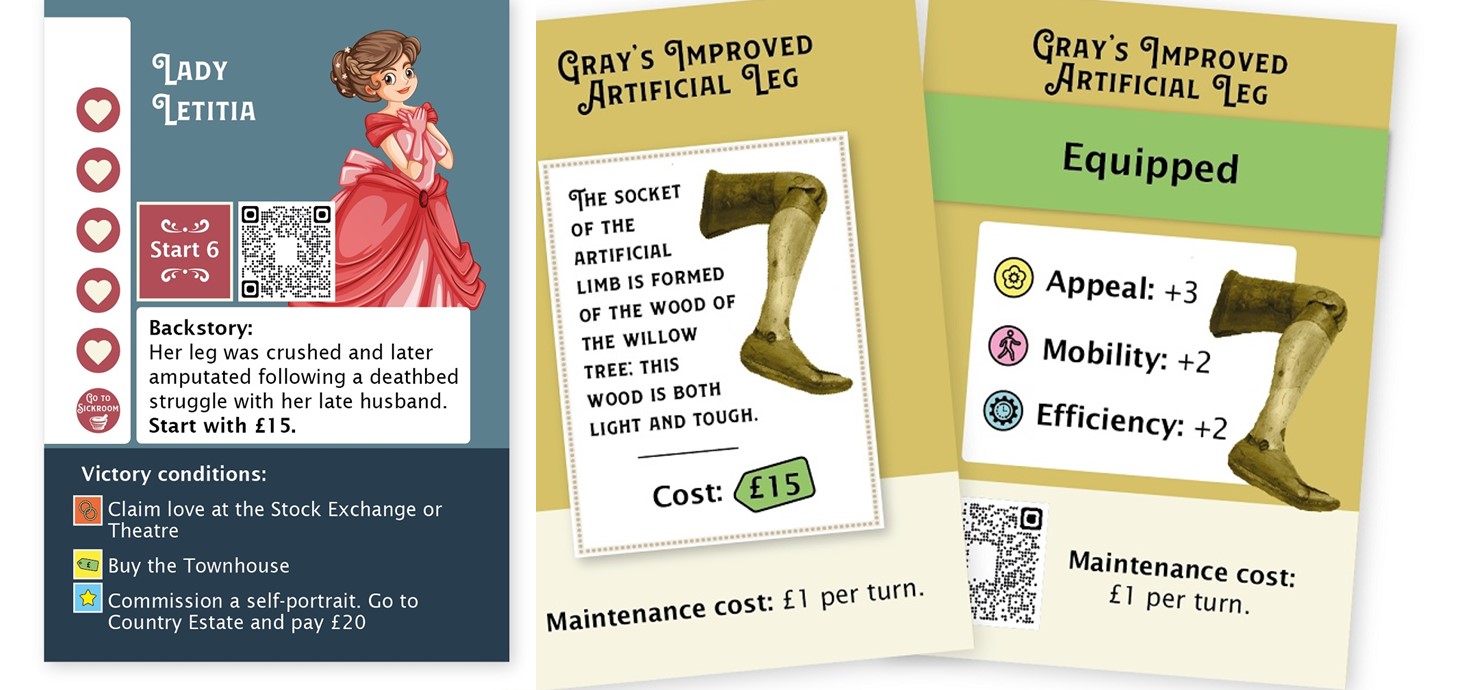
Cards from the Legless in London board game, which has won an international award. Designer Dr Ryan Sweet says the game is "a fun, engaging and inclusive tool to help players experience life as an amputee and reflect on how disabled people were and are treated in society."
A new board game called Legless in London, based on research completed at Swansea University, which brings disability culture and history to life in a significant and accessible way, has been announced as a winner at the 2025 Games for Change Awards in New York.
The game allows players to experience the challenges and opportunities that Victorian London presented to lower-limb amputees.
Through the game, all players play as an amputee and attempt to achieve life goals such as buying property, finding love or fulfilling personal ambitions. Players navigate the Victorian streets, the prosthetic limb market, the sickroom, and various locations that provide them with opportunities to achieve their aims.
The game is based on research by Dr Ryan Sweet, an expert in disability history, and by his 2022 book Prosthetic Body Parts in Nineteenth-Century Literature and Culture. Many of the game's characters, prosthetic limbs, locations, and scenarios are inspired by research he conducted in his time at Swansea University. He is now a Lecturer in English and Creative Writing at the University of Plymouth.
The annual Games for Change Awards are a celebration of the games that aspire to elevate the medium, pushing gaming forward with innovative new ideas, fresh artistic directions, and positive social messaging.
Legless in London was announced as the winner in the Best Board or Tabletop Game for Impact category. The announcement was made at a ceremony in New York.
The game is designed and produced by Focus Games in conjunction with Dr Sweet and Swansea University
The team designed the game in an inclusive way, liaising closely with a focus group of members of the disabled community, including Disability Arts Cymru.
Accessibility is also at the heart of the design with features such as:
- Easy Read rules.
- Large accessible fonts and dual differentiation on game pieces.
- Screen-reader-friendly digital versions of game assets available via QR codes and www.leglessinlondon.com.
- A free app that reduces the dexterity, numeracy, and requirements of the game for players
Dr Ryan Sweet, designer of Legless in London, said:
“The game aims to give more positive and nuanced representations of disabled people and disability in tabletop gaming.
Disability history has been virtually absent from tabletop gaming up to now and in the few games where disabled people are portrayed these are oftentimes problematic. Also, many existing games present accessibility challenges for disabled players.
Legless in London is a fun, engaging and inclusive tool to help players experience life as an amputee and reflect on how disabled people were and are treated in society.
Since we released the game in February, we’ve engaged over 170 players through launch events, and we've received overwhelming positive feedback.”
Following the success of Legless in London, Dr Sweet and Focus Games are now collaborating to create a set of inclusive design guidelines for tabletop games makers.
To find out more about the game please visit www.leglessinlondon.com
Legless in London is produced and marketed under a commercial agreement between Swansea University and Focus Games Ltd, with generous support from the Arts and Humanities Research Council [AH/X00354X/1, AH/Z506485/1].
